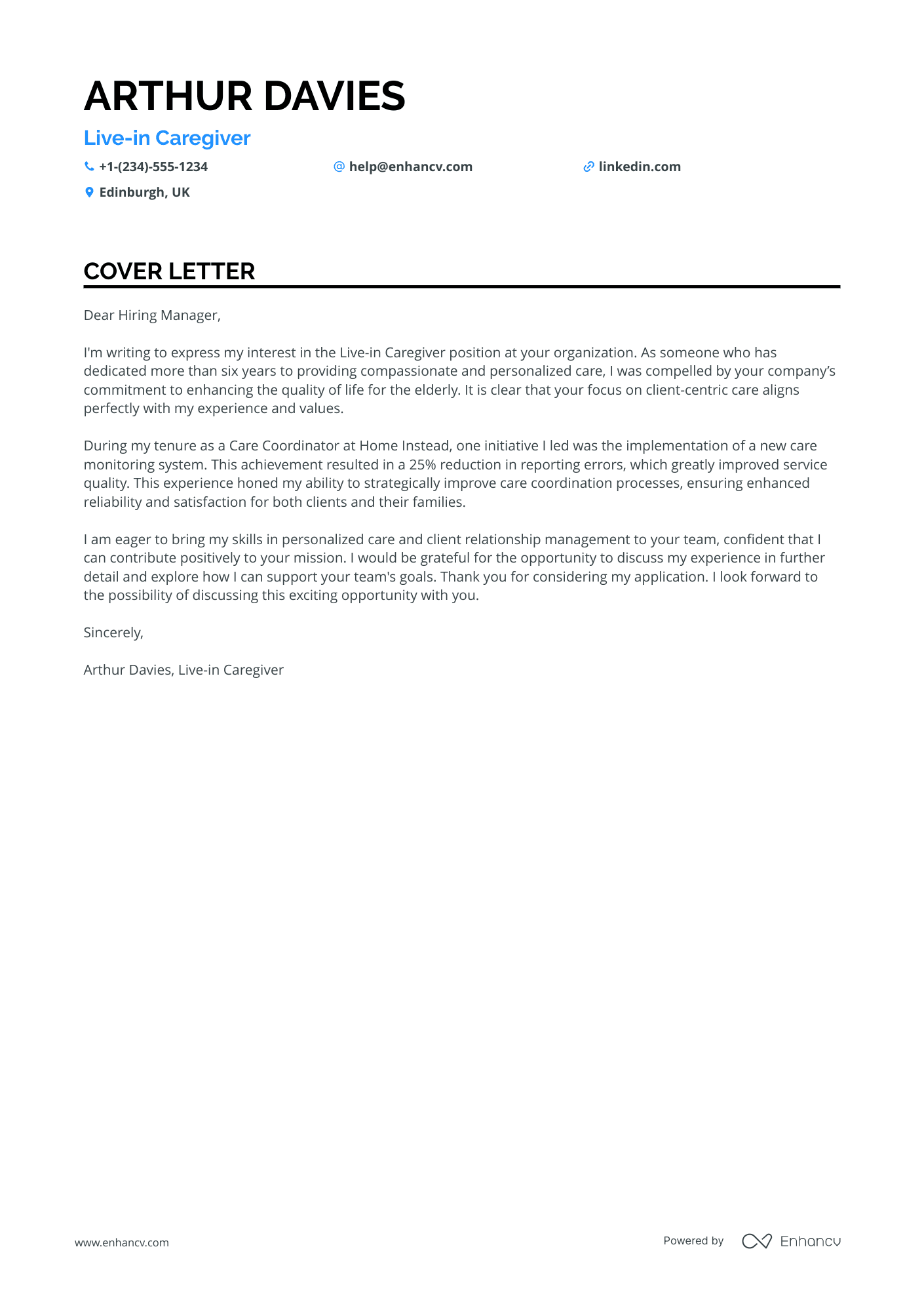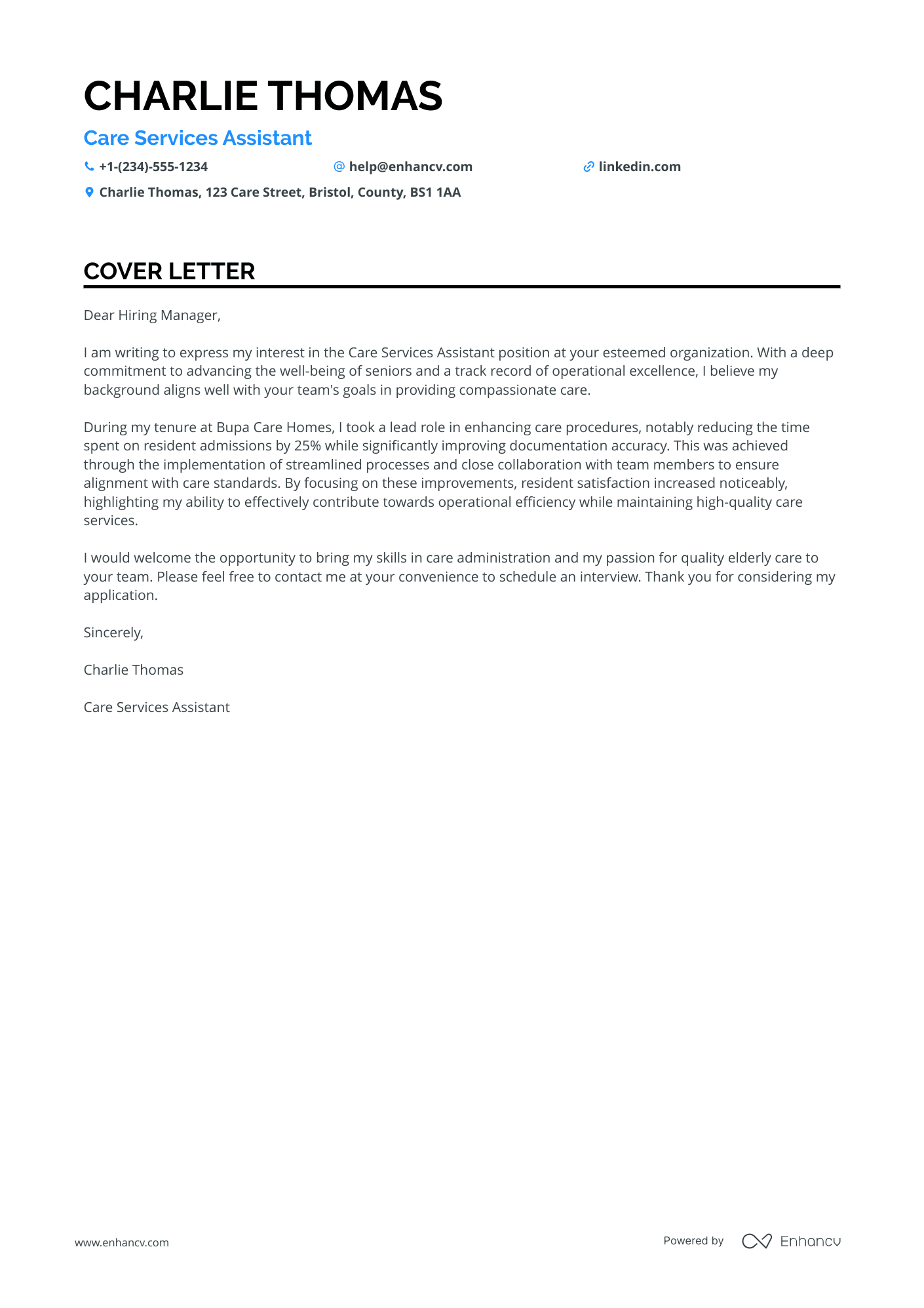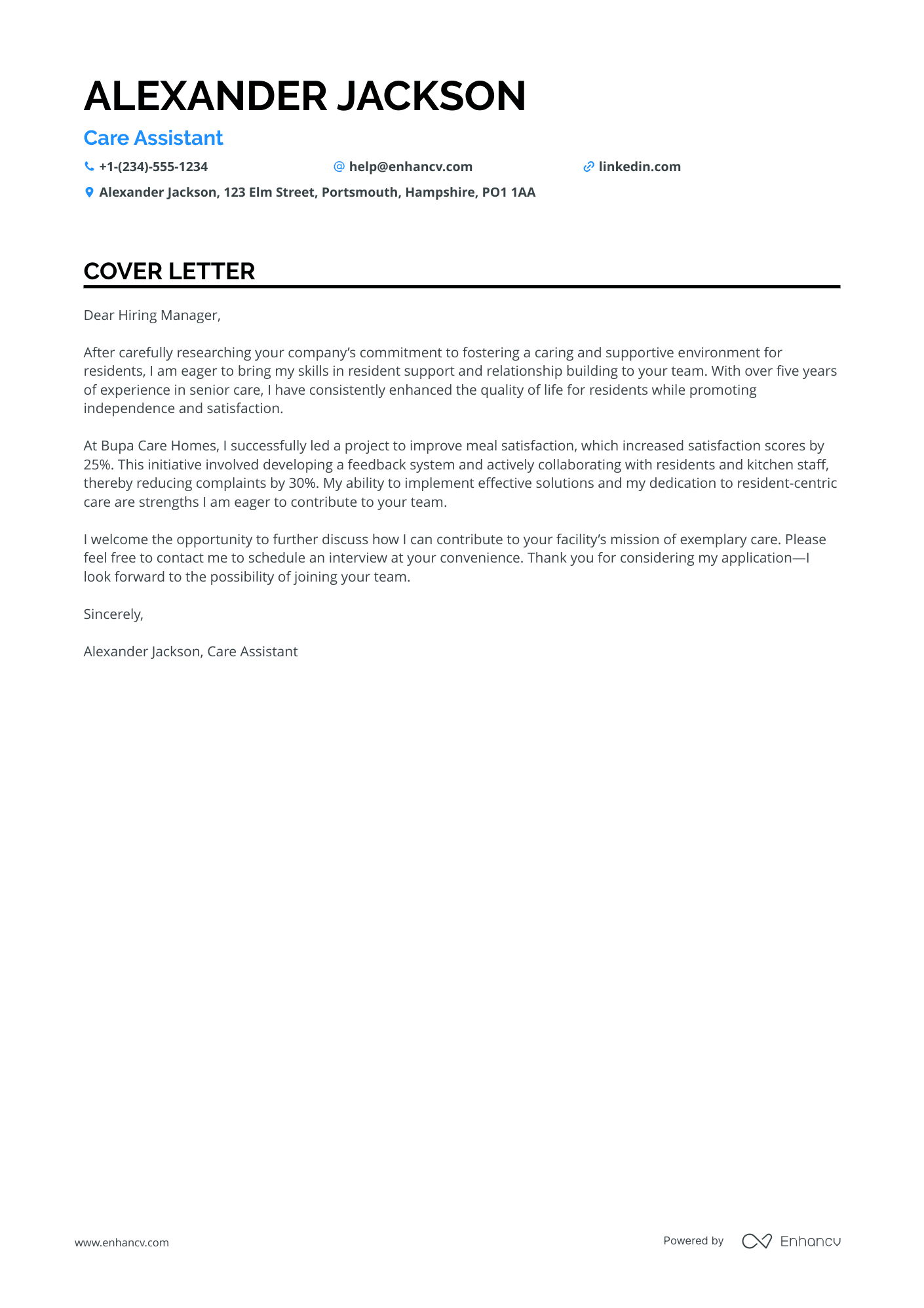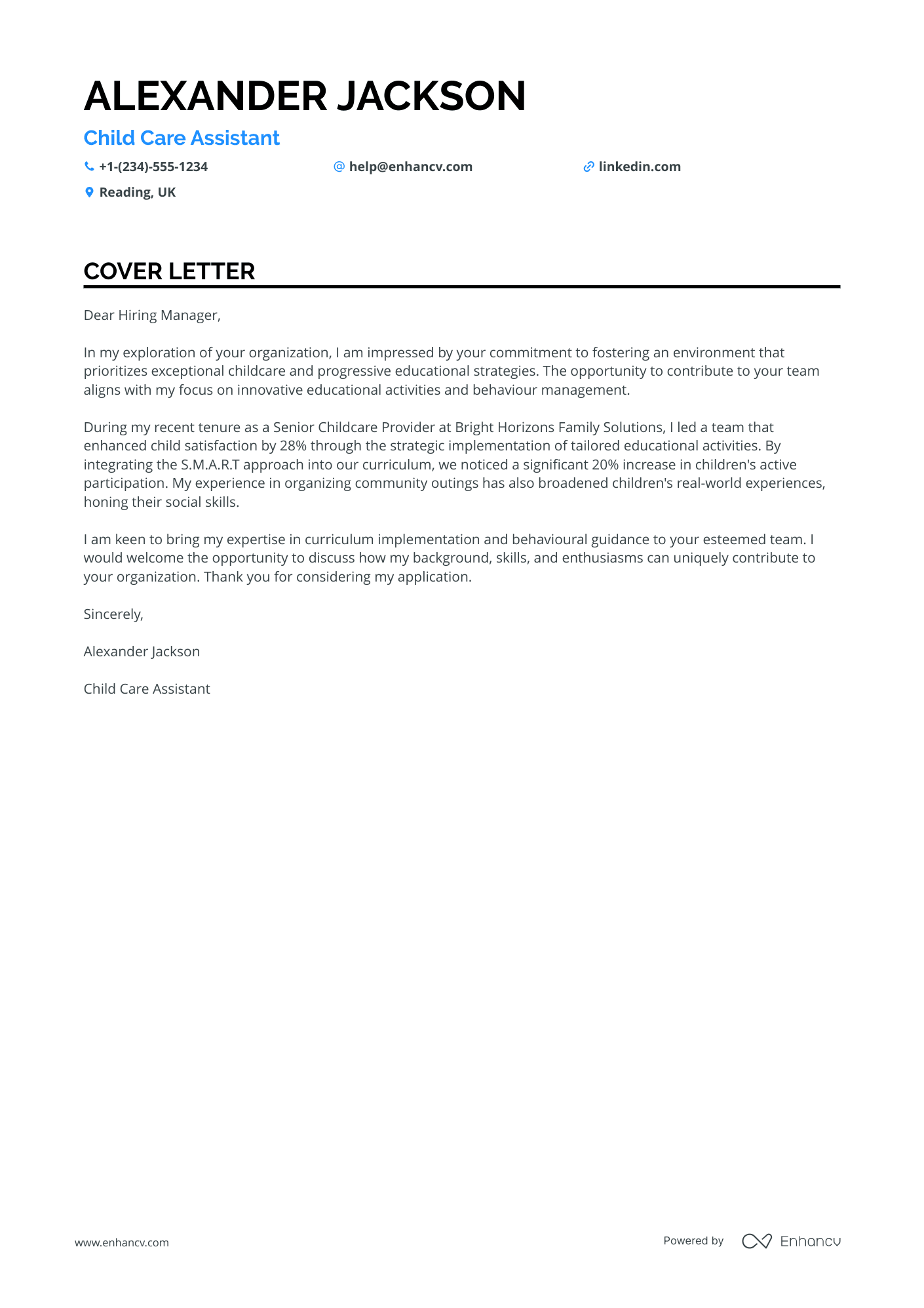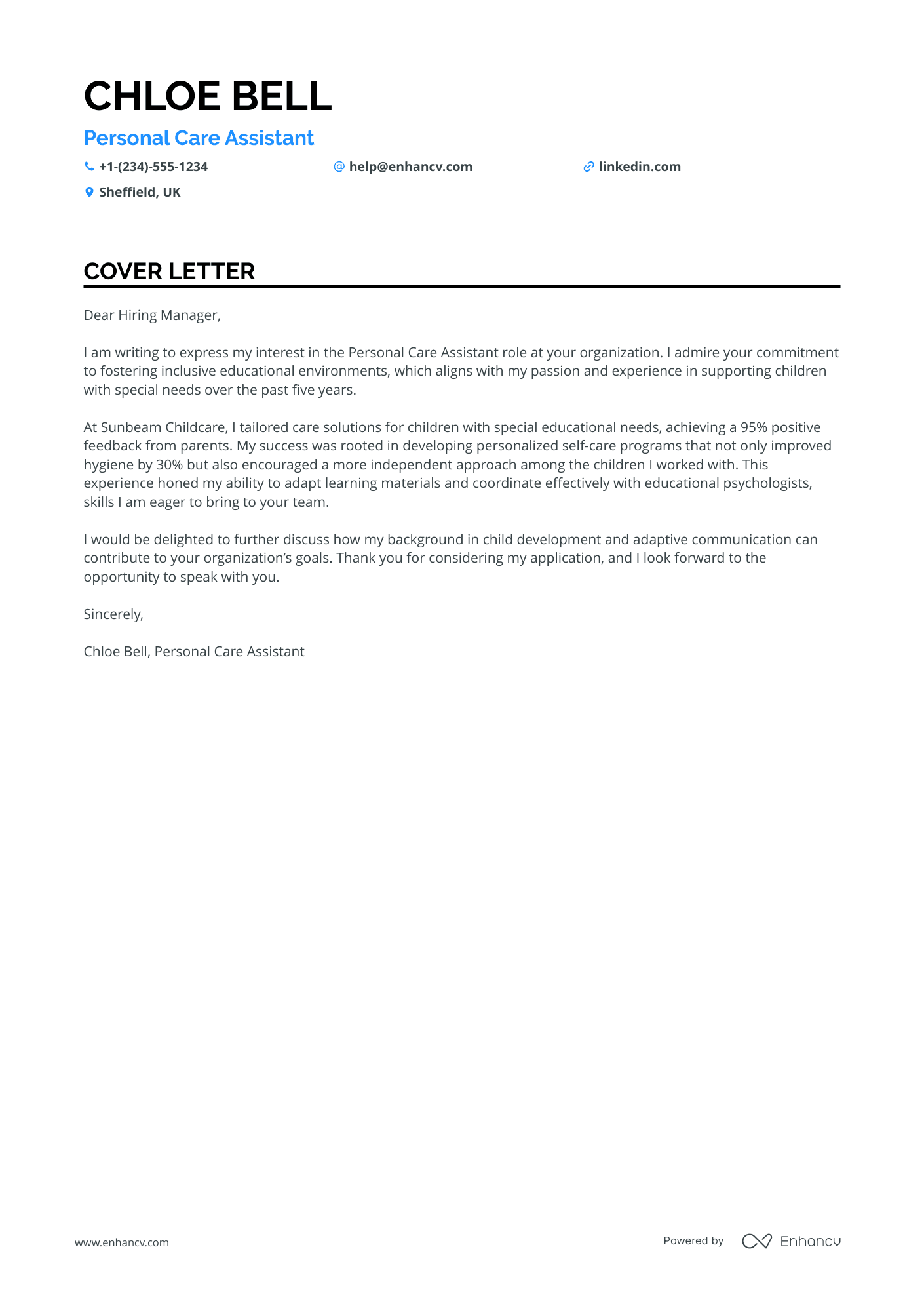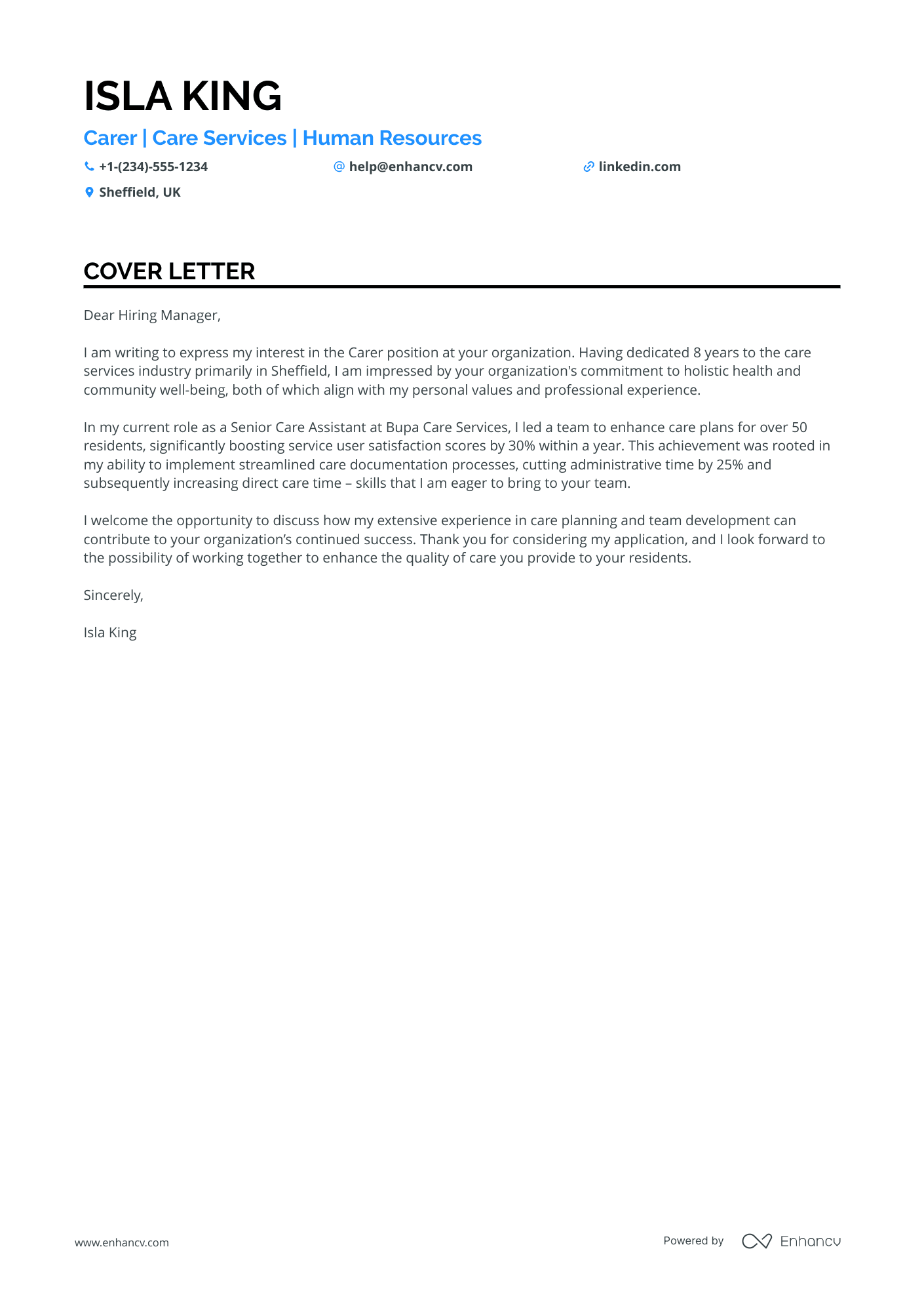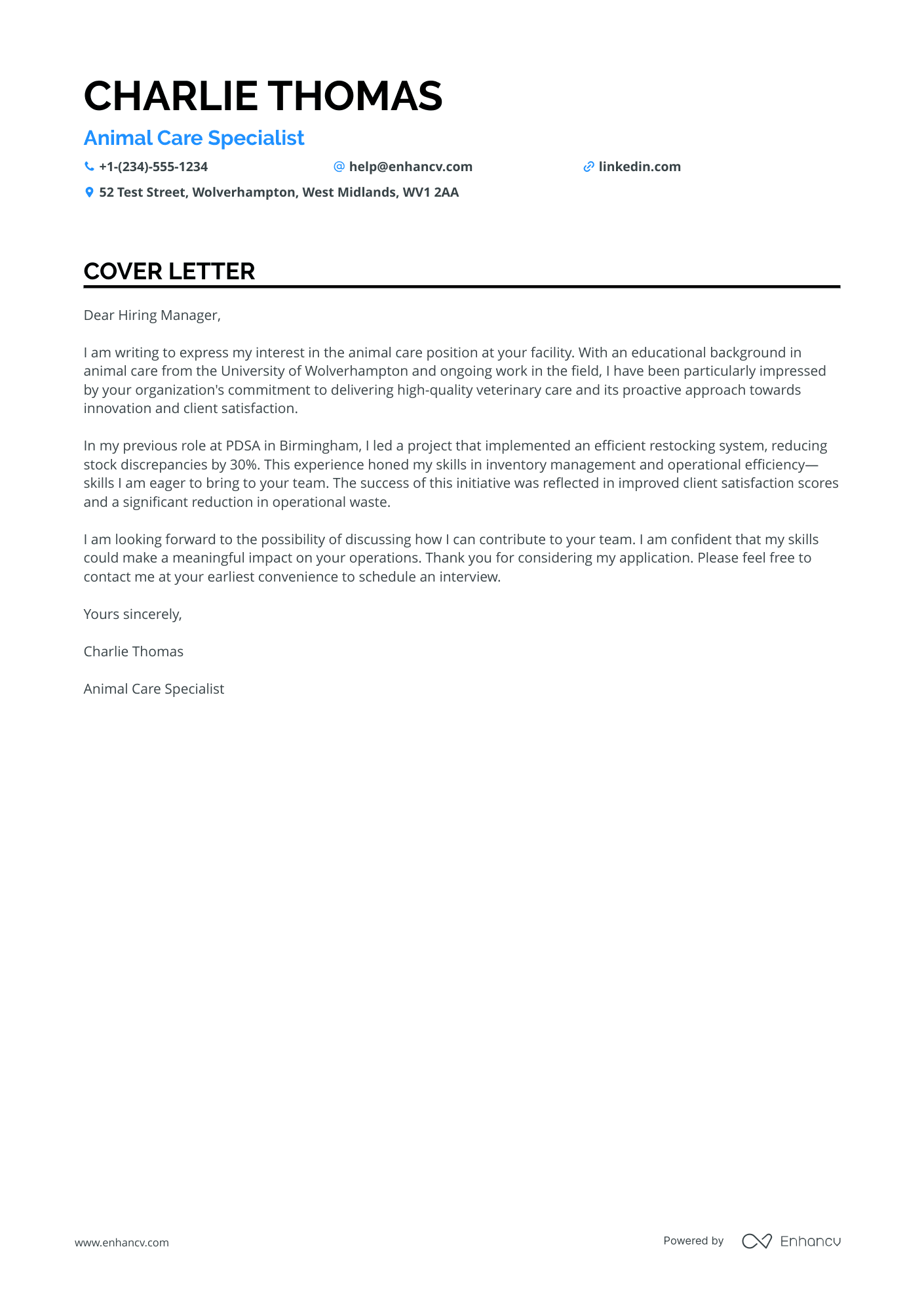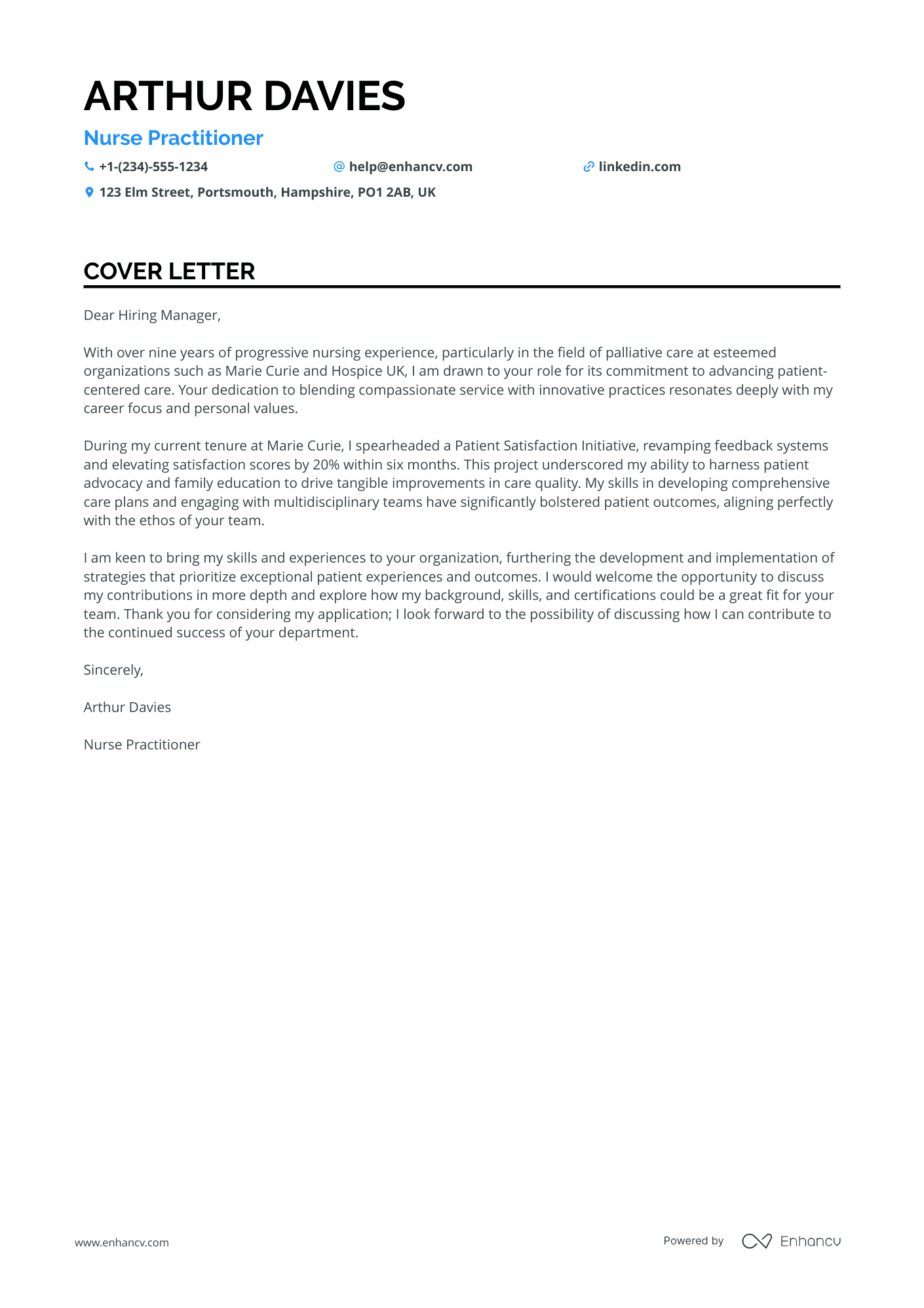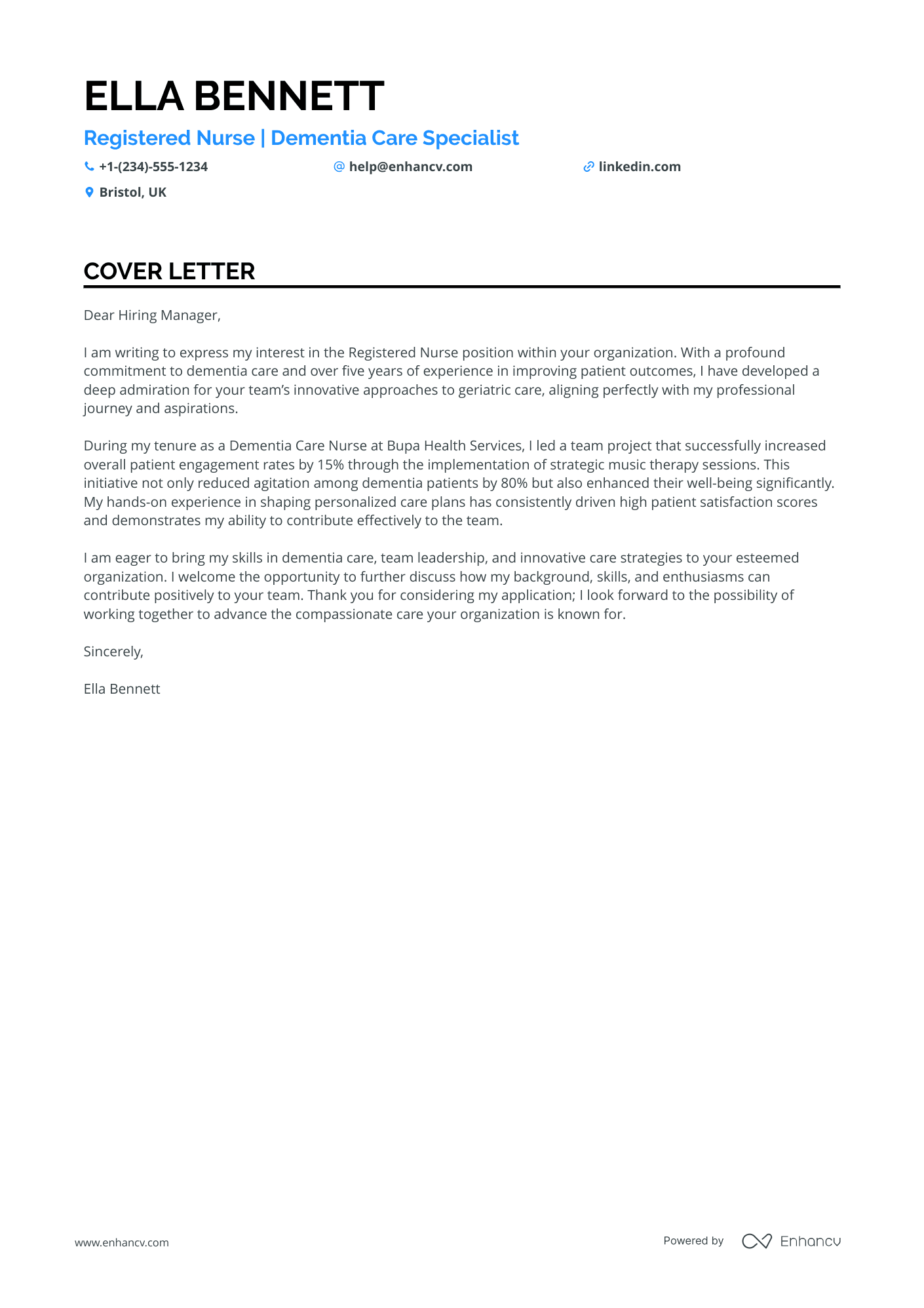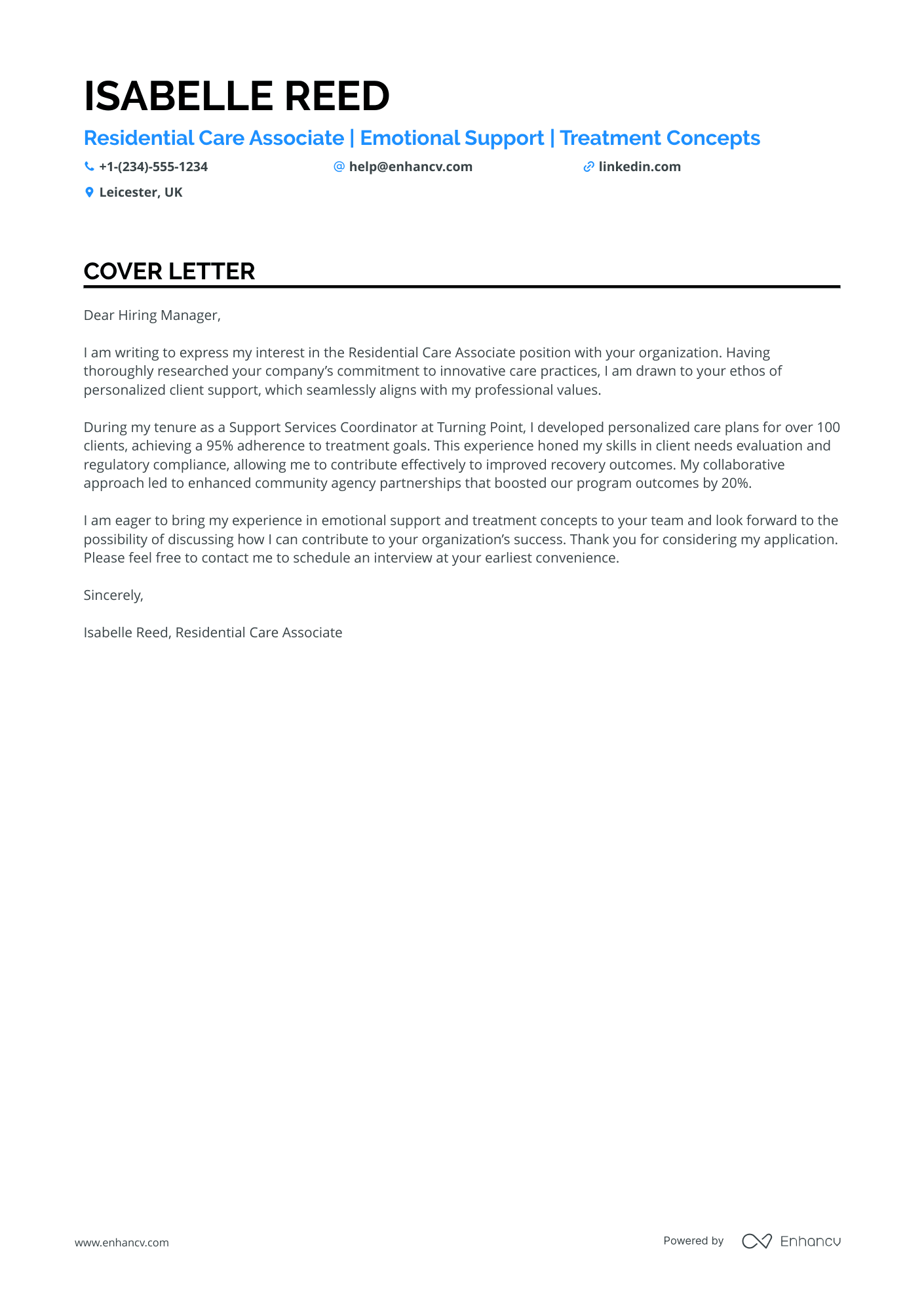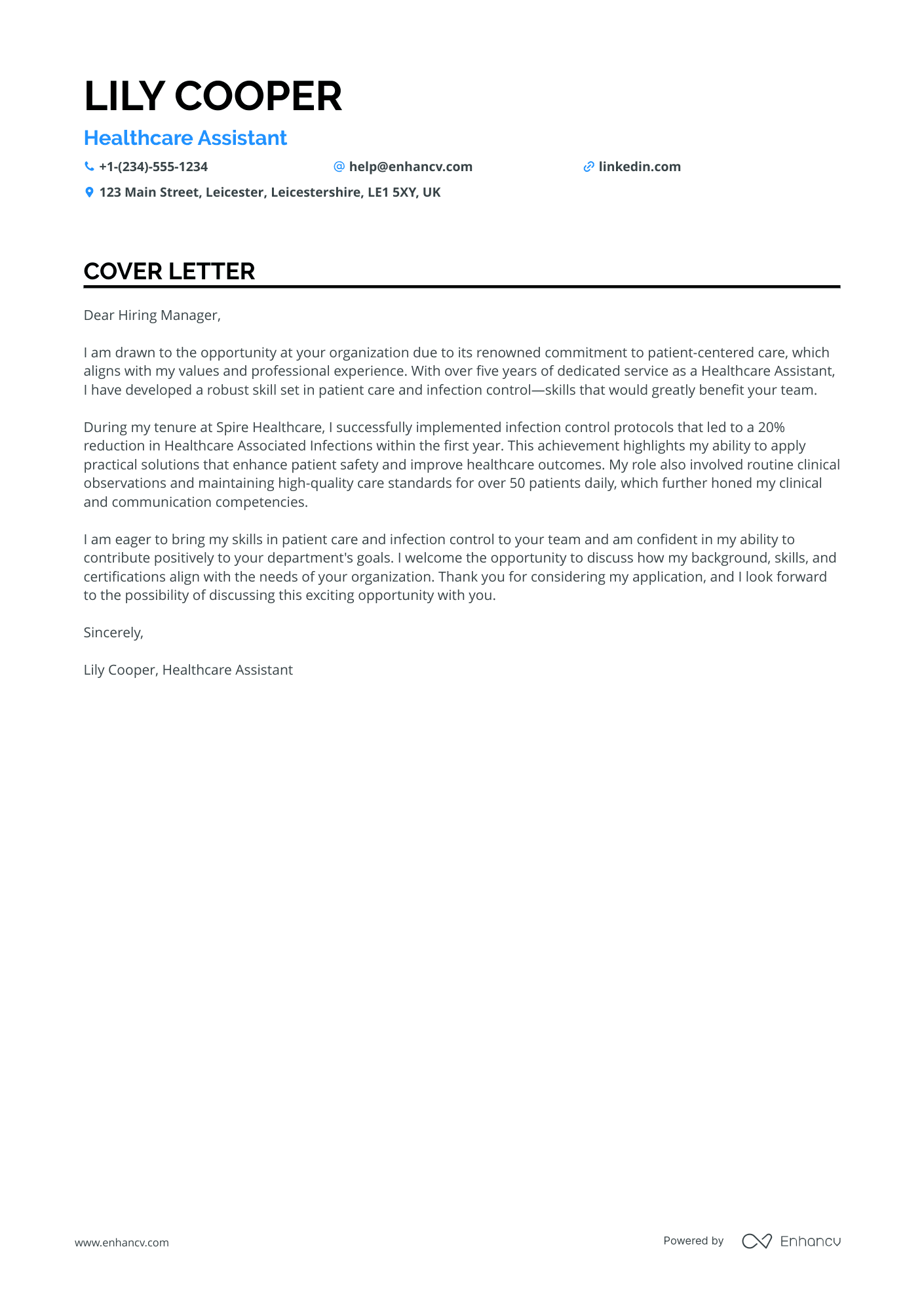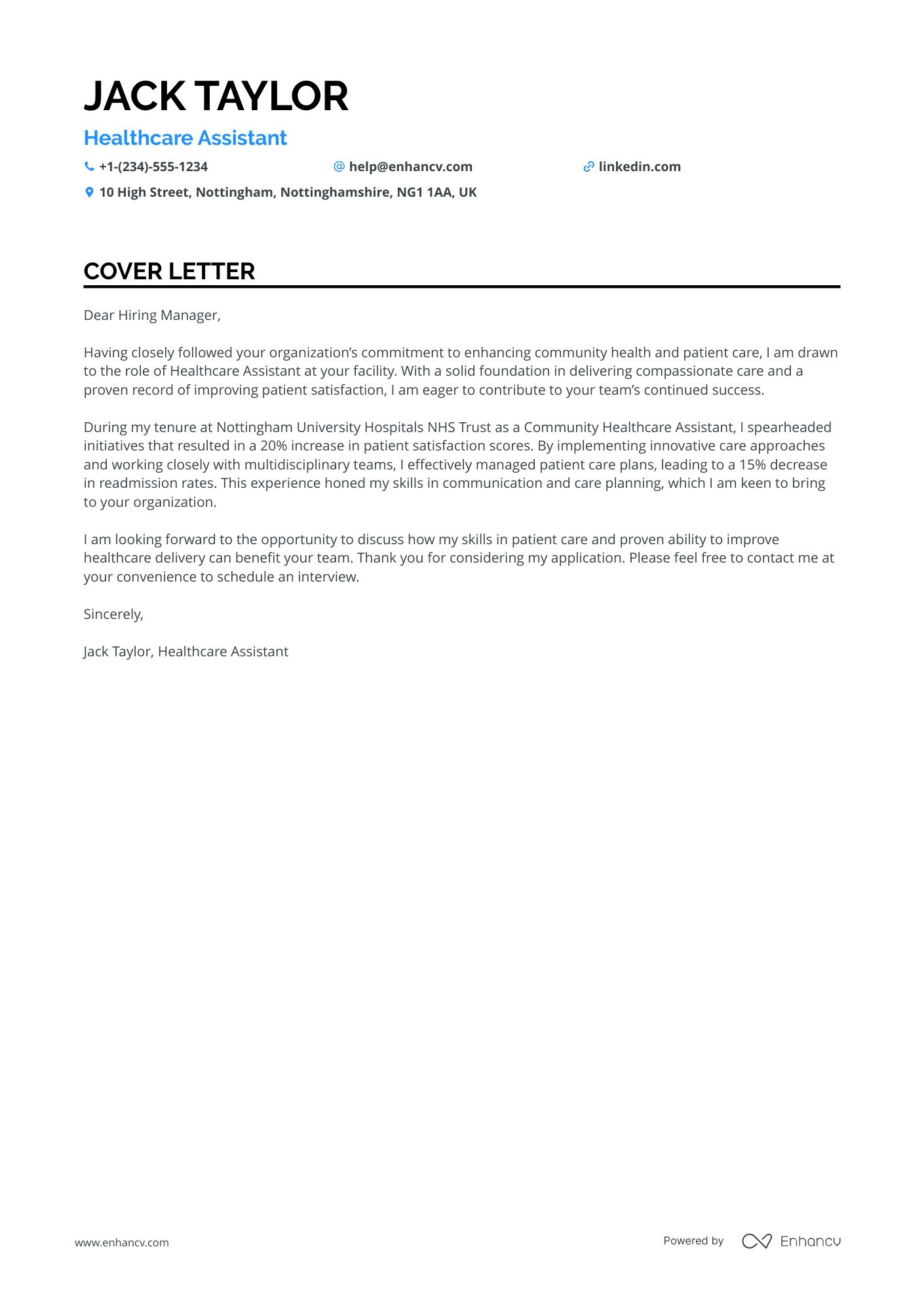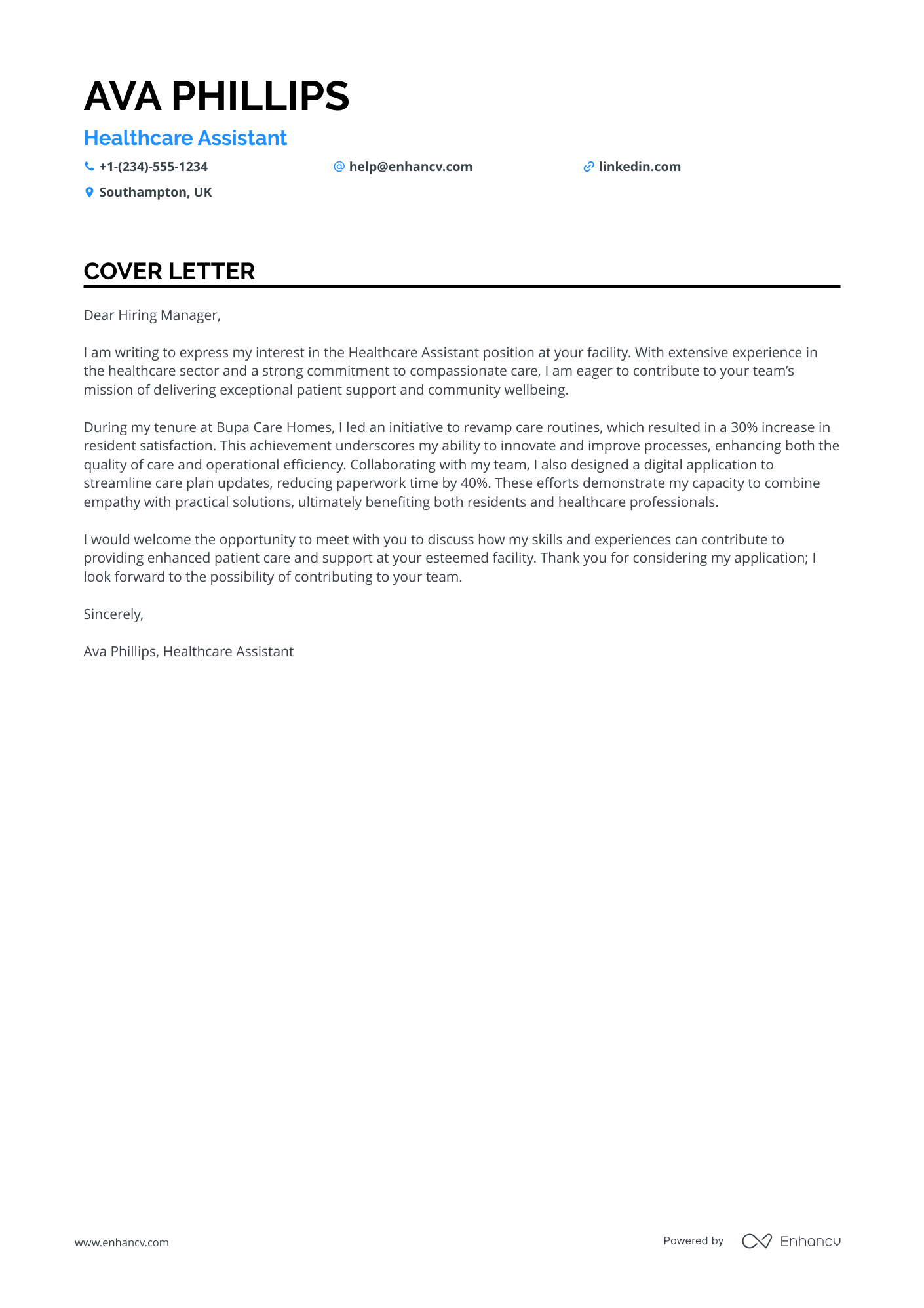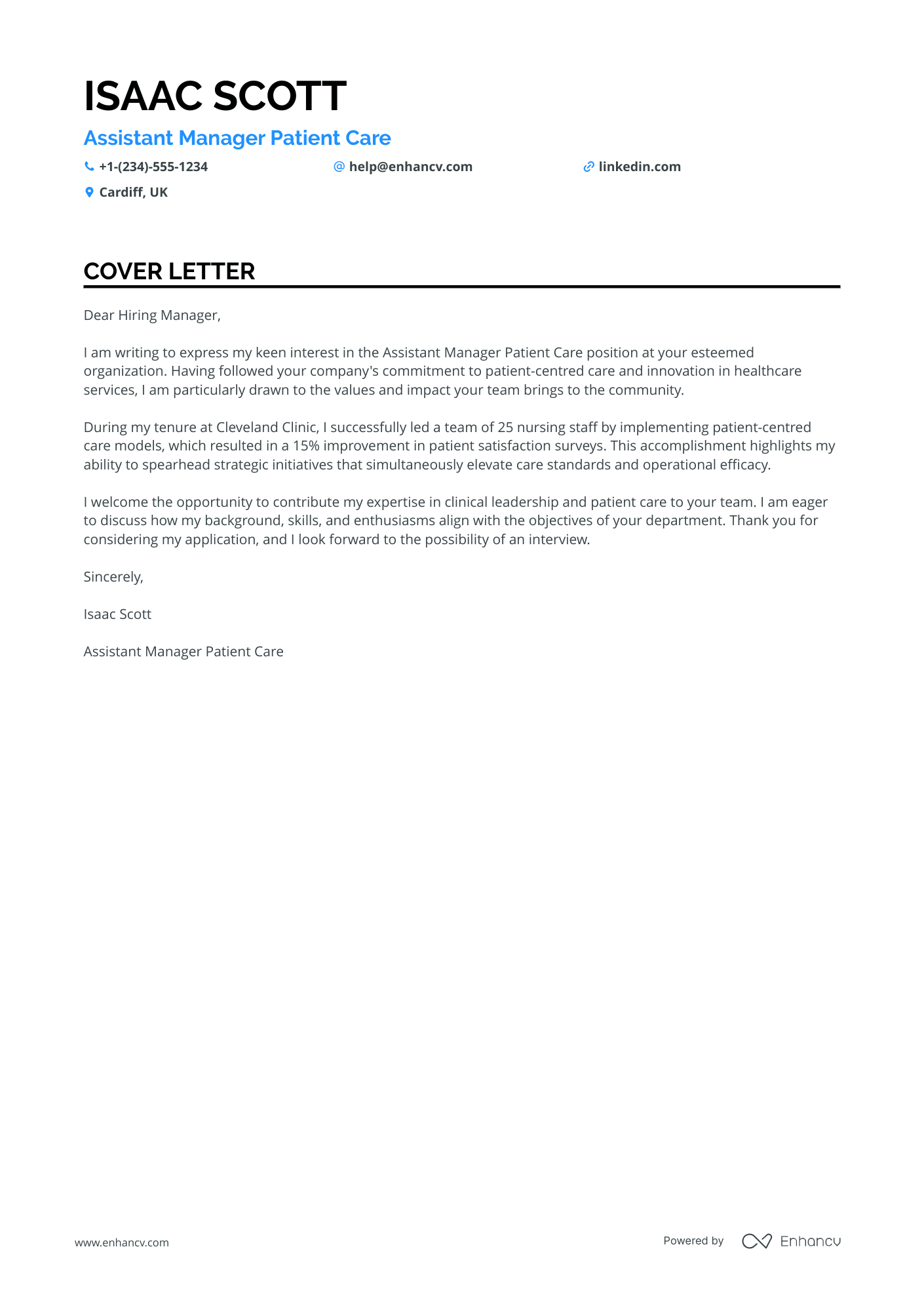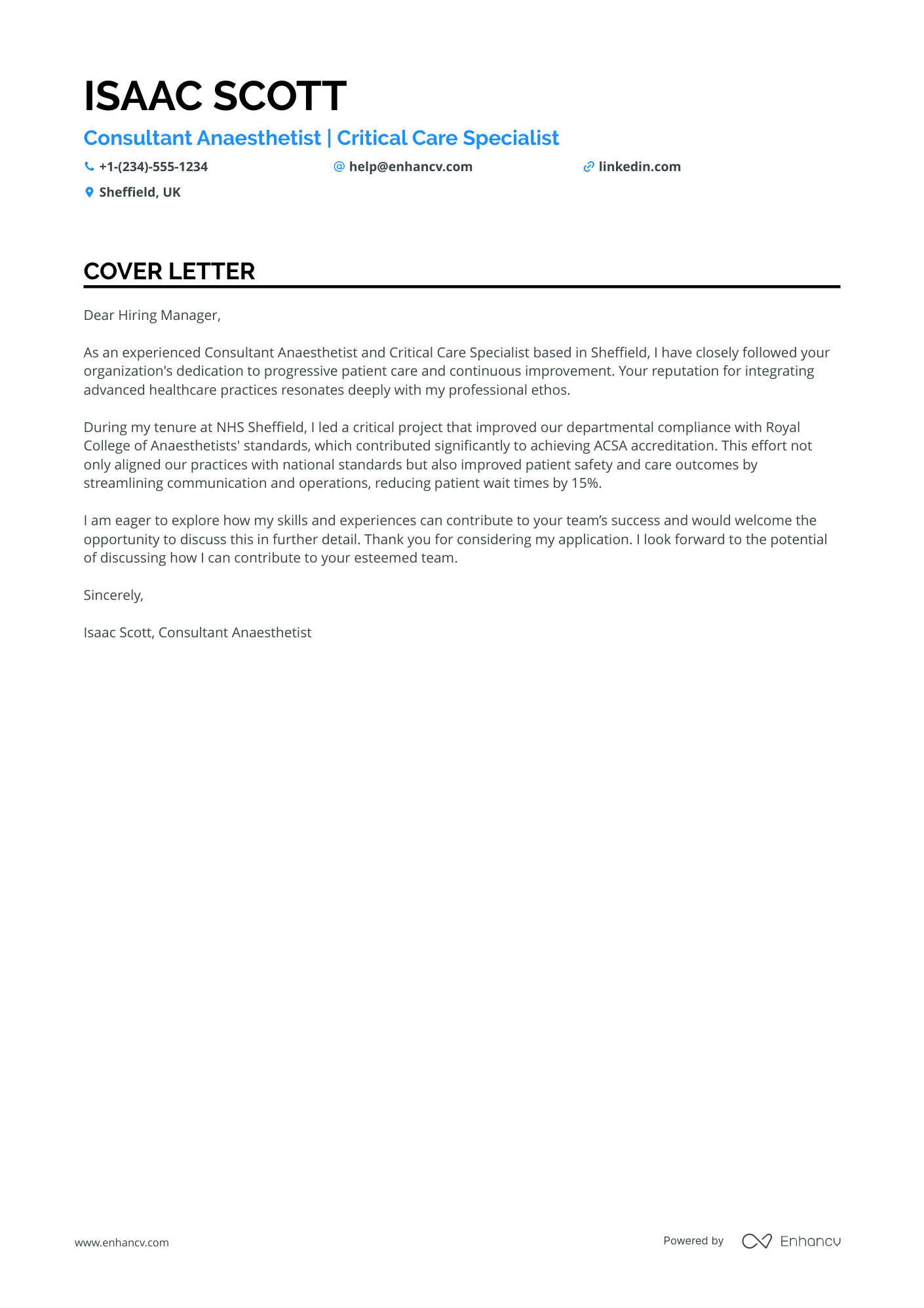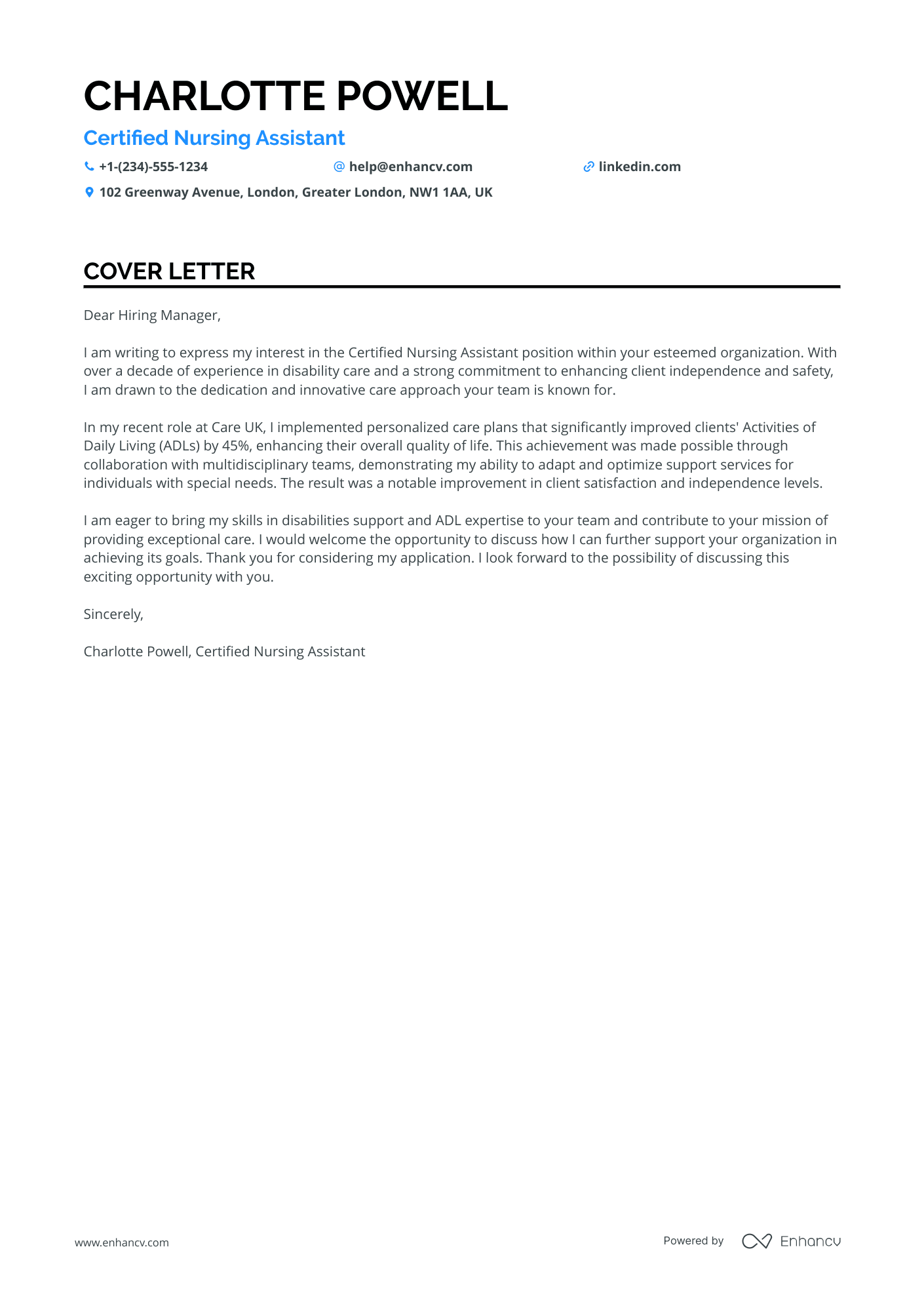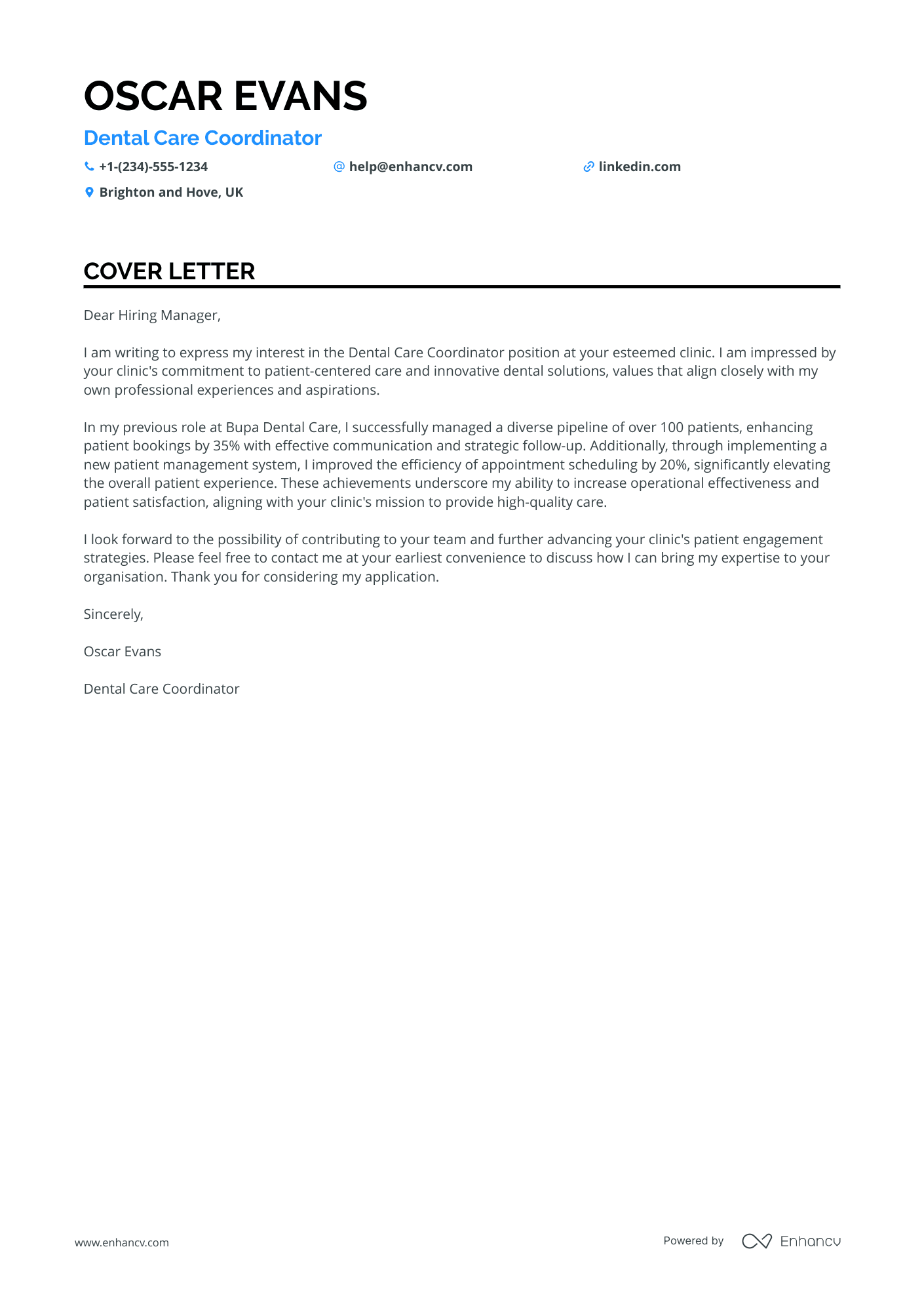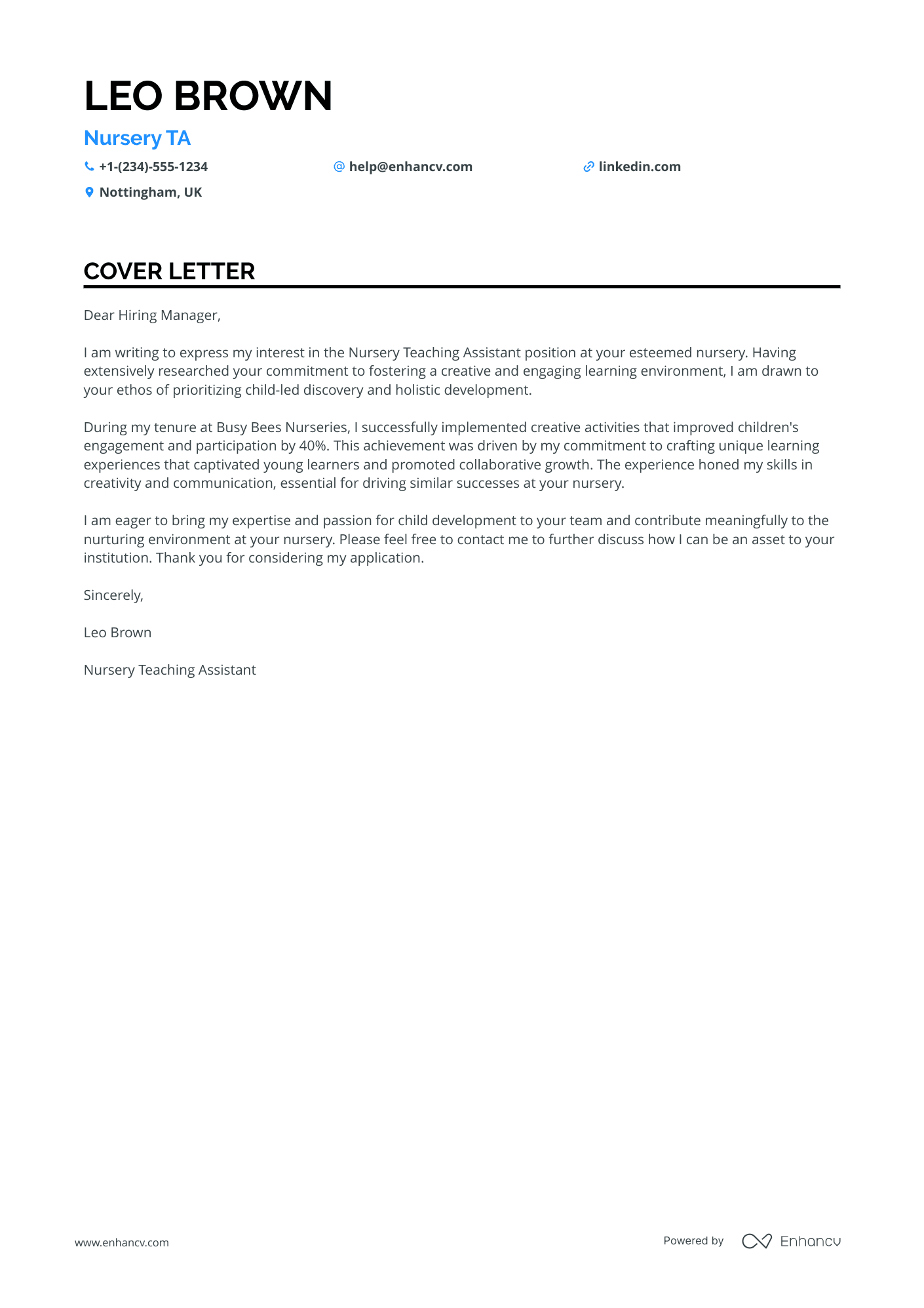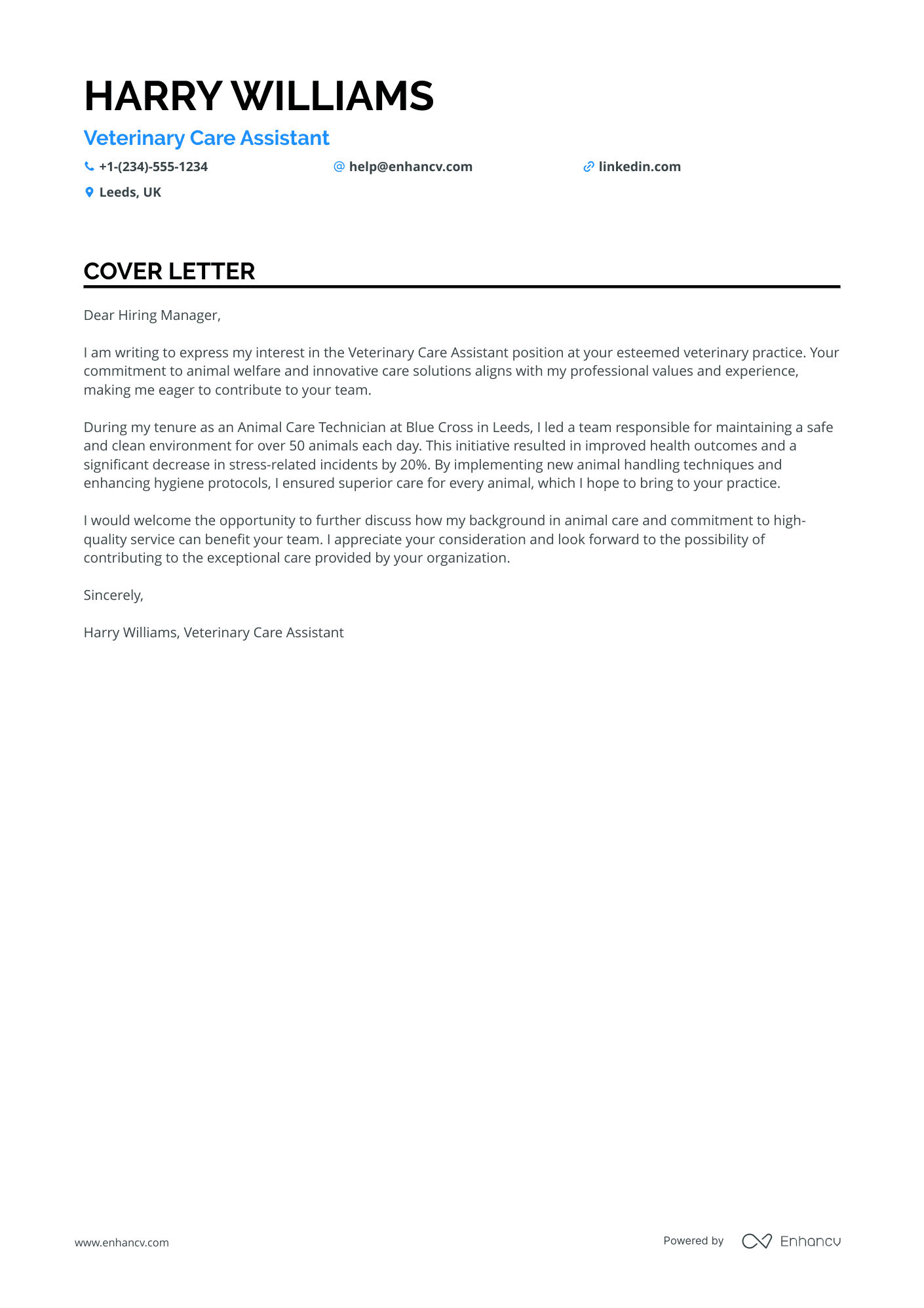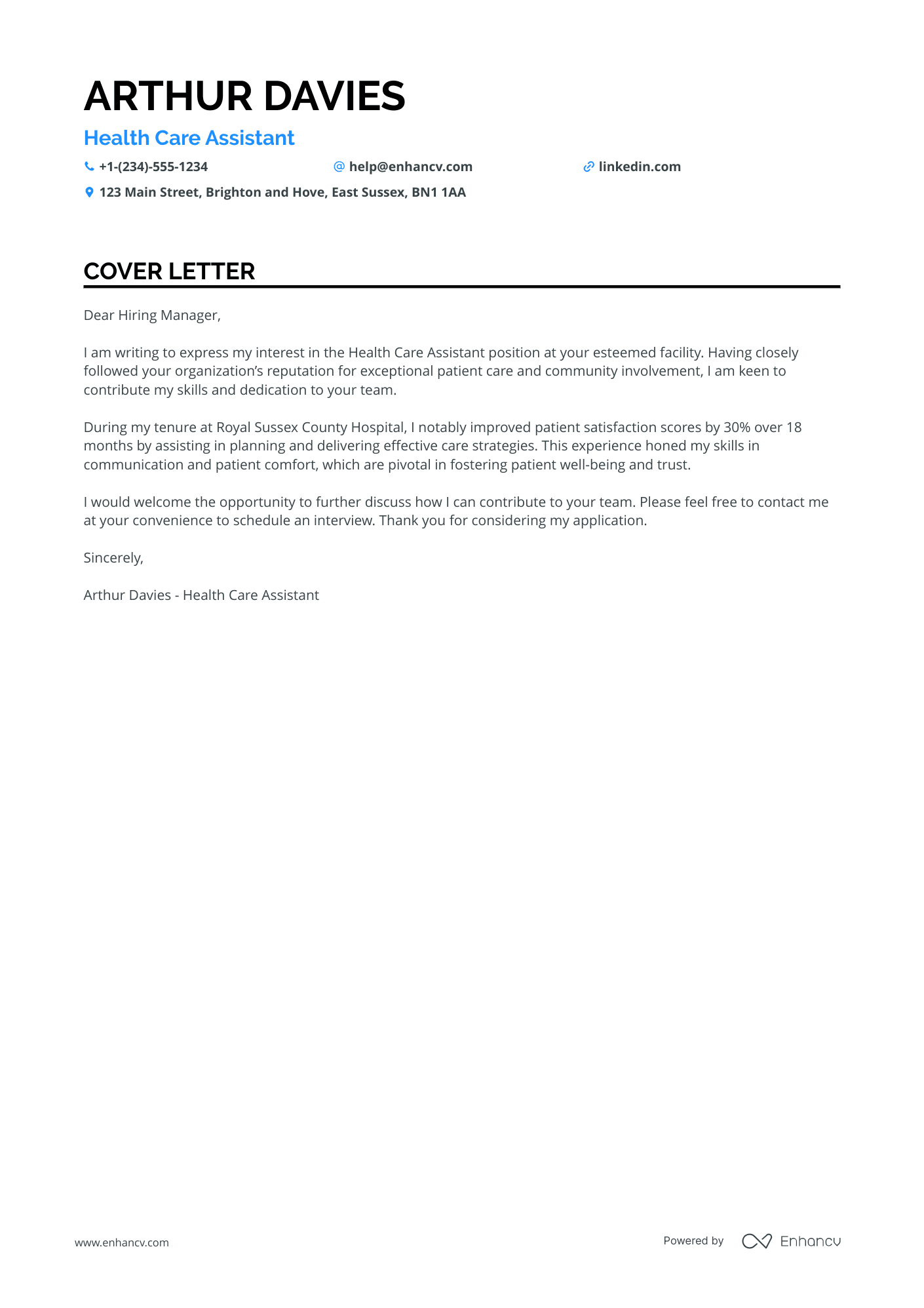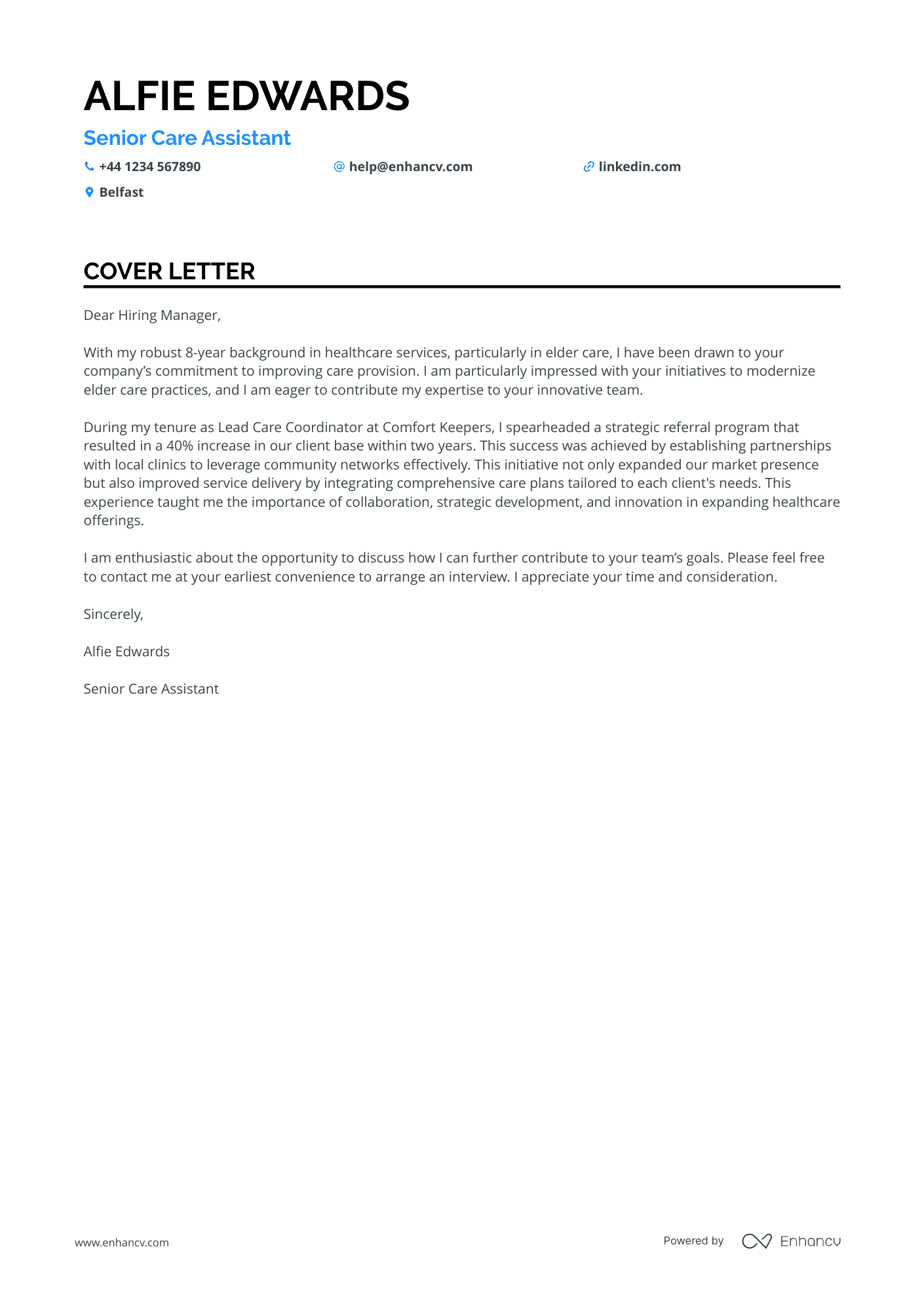Congratulations on completing your first cover letter. However, as you look back, you realise it’s simply a copy-paste of your CV.
Repeating your curriculum vitae is a common pitfall that many candidates encounter, making the cover letter redundant.
Your cover letter should provide fresh insights, adding more value to your application. It’s also the ideal space to address career gaps or major transitions that might not be covered in your CV.
In this guide, you’ll learn how to use your cover letter to demonstrate why you’re the best candidate for the role, while confidently addressing your career history and key achievements.
Cover letter examples for care assistant
By Experience
Senior Care Assistant
- Highlight Relevant Experience: The cover letter effectively emphasises Arthur's extensive experience in caregiving roles, showcasing significant achievements such as increasing client satisfaction by 20% and enhancing team performance.
- Certifications and Training: The inclusion of certifications like "Dementia Care Certification" accredited by Alzheimer's Society and "First Aid at Work Training" underscores specialised skills valuable for caregiving roles.
- Skills and Achievements: The letter highlights key skills such as care plan development and team leadership, complemented by achievements like receiving the "Top Care Coordinator Award."
- Personal Passion Alignment: Mentioning passions such as "Elderly Care Advocacy" aligns personal interests with professional responsibilities, reinforcing commitment to the role.
Lead Care Assistant
- Relevancy of Experience: The cover letter effectively highlights relevant experience in care settings, demonstrating a deep understanding of the skills required for the role, such as care administration and direct patient care.
- Achievement Oriented: Specific achievements such as reducing agency dependency, increasing resident satisfaction scores, and enhancing the admission process provide tangible evidence of the applicant's impact in previous roles.
- Skills and Certifications: The inclusion of specific skills like OnShift, PointClickCare, and certifications such as the Nurse's Aide Certification, highlight industry-specific expertise and readiness for the role.
- Passion for Elderly Care: The candidate's passion for elderly care advocacy and community initiatives adds a personal touch and indicates a genuine commitment to the field beyond professional obligations.
By Role
Elderly Care Assistant
- Relevant Experience Highlight: The cover letter effectively underscores over 5 years of hands-on experience in care roles, which is crucial for a Care Assistant position.
- Emphasis on Key Achievements: It showcases specific accomplishments such as improving meal satisfaction scores by 25% and implementing care strategies that enhance overall resident care, providing tangible results of effectiveness.
- Skills Alignment: Skills like "Communication" and "Interpersonal skills" are directly mentioned, aligning well with the demands of resident interaction and care plan revisions.
- Specialised Training Emphasis: Highlights courses like "Advanced Dementia Care Training," which is vital for specialised roles related to dementia care, showcasing in-depth knowledge pertinent to the role.
Child Care Assistant
- Highlighting Relevant Experience: The cover letter effectively showcases 5 years of experience in childcare supervision, emphasising achievements like improving child engagement by 30% through educational activities.
- Specific Skill Emphasis: The inclusion of skills such as curriculum implementation, behaviour management, and emergency procedure execution aligns well with the requirements of a Child Care Assistant role.
- Education and Certifications: Noting the Level 3 Diploma in Childcare and Education, along with certifications like Paediatric First Aid and S.M.A.R.T Curriculum Training, strengthens credibility in the field.
- Achievement-Oriented: The cover letter outlines quantifiable achievements, like a 22% increase in parent satisfaction and a 15% reduction in behavioural incidents, demonstrating the candidate's effectiveness and impact.
Personal Care Assistant
- Specific Experience in Child Support: Highlighting over 5 years of dedicated experience working in child support roles, particularly in challenging environments, establishes Chloe's competence and reliability in similar positions.
- Measurable Achievements: Including quantifiable achievements, like a 95% positive feedback rate and improved social interaction by 40%, effectively demonstrates Chloe's impact and success in previous roles.
- Relevant Certifications and Training: Mention of relevant courses such as "Specialised Childcare Practices" and "Behaviour Management for SEND" proves her commitment to continuous learning and expertise in addressing children's diverse needs.
- Emphasis on Key Skills: Skills like adaptive communication, conflict resolution, and development of personalised care programmes align well with the demands of a Personal Care Assistant role, reinforcing her fit for the position.
Home Care Assistant
- Emphasise Achievements: Highlighting specific achievements such as the "Outstanding Care Service Award" and the "100% audit success rate" effectively showcases exceptional performance and dedication to maintaining high-quality care standards.
- Relevant Experience: Detailing extensive experience in care roles, from Care Assistant to Senior Care Assistant, demonstrates progression and a deep understanding of the care services sector, which is crucial for the role.
- Certification Highlight: Mentioning certifications like the "Care Quality Assurance Certification" validates your knowledge of compliance and standards in care management, a critical aspect of carer roles.
- Transferable Skills: Skills such as care planning, team development, and regulatory compliance are highlighted, showcasing abilities that are directly applicable and valuable in the caregiving domain.
Animal Care Assistant
- Relevant Experience: The cover letter effectively highlights over 6 years of experience in animal care, specifically mentioning roles that align closely with the position being applied for, demonstrating direct relevance to potential employers.
- Measurable Achievements: It includes quantifiable accomplishments such as a 15% increase in client satisfaction and a 30% reduction in stock discrepancies, which provide concrete evidence of the candidate's impact.
- Specialised Skills and Certifications: It mentions key skills and certifications such as Veterinary Assistant Certification and Animal First Aid Course, which are crucial for the role and underline the candidate's preparedness for the responsibilities involved.
- Team and Community Engagement: The cover letter notes successes in team training and expanding community outreach, indicating strong interpersonal skills valuable for roles involving collaboration and public interaction in animal welfare settings.
Palliative Care Assistant
- Relevant Certifications: Highlighting certifications in 'Palliative and End of Life Care' and 'Advanced Pain Management' shows a specific expertise that aligns exceptionally well with the palliative care nursing role.
- Quantifiable Achievements: Emphasising achievements like improving patient satisfaction scores by 25% and reducing administrative time by 30% gives concrete evidence of training and initiatives that have led to measurable success.
- Leadership in Educational Initiatives: Mentioning leadership roles in patient and family education as well as training program development underscores a commitment to enhancing family knowledge and developing team skills, reflecting a proactive approach to improving service delivery.
- Passion for End-of-Life Advocacy: Demonstrating a dedication to end-of-life care advocacy enhances the cover letter by conveying a deeper, personal commitment to the field beyond just professional achievements.
Dementia Care Assistant
- Highlight Relevant Experience: The cover letter effectively details the candidate's extensive experience in dementia care, acute care, and personalised care planning which are crucial for the role of a Registered Nurse in specialised healthcare.
- Certifications and Training: It prominently features completed courses like the "Alzheimer's Care Certification," showcasing specialised knowledge that directly enhances roles requiring dementia care expertise.
- Measurable Achievements: Utilising specific metrics, such as reducing care-related incidents by 20%, effectively underlines the candidate's ability to improve safety protocols and operational efficiency.
- Soft Skills and Passions: The inclusion of passions like mindfulness practices and interest in geriatric care advancements reflects the candidate's holistic approach to care, supporting both personal and professional development.
Residential Care Assistant
- Certification Highlight: Mentioning the "Certificate in Relapse Prevention Techniques" from the UK Mental Health Association could be crucial for roles in mental health support, emphasising specialised knowledge.
- Focus on Achievements: Highlighting data-driven achievements, like a "30% increase in client satisfaction" or "85% program completion rate," can demonstrate the applicant's impact on tangible outcomes in their previous roles.
- Relevant Experience: Detailing experience with specific tasks such as "Implemented a new resident orientation process" and "Facilitated weekly recovery workshops" that directly relate to the responsibilities of the role can attract more attention.
- Skills Emphasis: Emphasising skills such as "Regulatory Compliance" and "Relapse Prevention," which are essential for a Residential Care Associate role, ensures that the applicant's capabilities align with job requirements.
Hospital Care Assistant
- Highlight Relevant Certifications: Emphasising the Infection Prevention and Control Certification is crucial, as it directly aligns with the role's focus on infection control, showcasing a proactive approach to reducing Healthcare Associated Infections.
- Detailing Responsibilities: The cover letter effectively communicates specific responsibilities, such as conducting clinical observations and assisting with emergency response, which are essential skills for a Healthcare Assistant dedicated to patient care.
- Emphasis on Achievements: By including quantifiable achievements like reducing Healthcare Associated Infections by 20%, the cover letter provides concrete evidence of past contributions and the potential impact within the new role.
- Highlighting Soft Skills: Proficiency in communication and teamwork is highlighted, essential for ensuring patient satisfaction and coordinating effectively with healthcare teams.
Community Care Assistant
- Highlight Relevant Certifications: Emphasising certifications such as the "Advanced Phlebotomy Techniques" and "Insulin Administration Certification" showcases specialised skills pertinent to healthcare roles.
- Emphasise Experience with Impact: Quantifiable achievements such as increasing patient satisfaction scores by 20% and reducing readmission rates by 15% demonstrate the applicant's ability to significantly enhance patient care and operational efficiency.
- Detail Leadership and Training Involvement: Mentioning the development of a training programme that reduced onboarding time by 30% highlights leadership skills and a commitment to fostering team development.
- Demonstrate Commitment to Safety and Quality Care: Noting the implementation of safety measures leading to a reduction in falls and contributing to a decrease in hospital-acquired infections underscores a dedication to maintaining high standards of patient care and safety.
Mental Health Care Assistant
- Emphasising the "Resident Satisfaction Improvement" achievement showcases the candidate's ability to enhance service quality, a critical aspect in healthcare roles.
- Highlighting skills such as "Emotional support" and "Patient care" demonstrates a strong alignment with the compassionate nature required in healthcare assistance.
- Underlining the "Certificate in Person-centred Dementia Care" highlights a specialised qualification, valuable for roles involving dementia patient care.
- Mentioning language proficiency, particularly in English and Spanish, reflects effective communication skills, essential for interacting with diverse patient backgrounds.
Emergency Care Assistant
- Highlight Clinical Leadership Experience: Ensure the cover letter emphasizes the applicant's extensive experience in clinical operations and leadership, showcasing their capability to manage and guide healthcare staff effectively.
- Showcase Achievements in Patient Care Improvement: The applicant should focus on accomplishments related to patient-centred care, such as implementing patient care models that led to improved patient satisfaction, as this aligns with the role's focus.
- Emphasise Cost Efficiency Initiatives: Demonstrating the ability to reduce operational costs while enhancing patient care showcases a strong balance of financial acumen and patient-focused service, which is valuable for managerial roles in healthcare.
- Highlight Mentoring and Staff Development: Discussing the implementation of mentoring programmes that decreased staff turnover highlights the applicant's leadership in fostering an engaging and supportive work environment.
Intensive Care Assistant
- Highlight Certifications: Mentioning certifications like "Advanced Trauma Life Support" showcases a commitment to continuous professional development relevant to a Consultant Anaesthetist role.
- Emphasise Team Leadership: Discussing experiences of mentoring and supervising teams demonstrates leadership abilities, crucial for roles requiring collaboration in patient care strategies.
- Mention Quantifiable Achievements: Using specific numbers to illustrate achievements, such as a "15% reduction in patient wait times," effectively highlights the impact of your contributions.
- Align with Industry Standards: Stressing compliance with the Royal College of Anaesthetists' standards showcases dedication to maintaining high professional standards.
Special Needs Care Assistant
- Highlighting a specialised certification such as the Certified Nursing Assistant (CNA) license is crucial for establishing credibility and expertise in providing care for individuals with special needs and disabilities.
- Emphasising skills in developing and implementing personalised care plans can showcase the ability to enhance the quality of life for clients, a key responsibility in disability care roles.
- Noting achievements in leading recreational programmes and community integration initiatives can demonstrate commitment to promoting inclusivity and enhancing client engagement and satisfaction.
- Listing experience in collaborating with multidisciplinary teams and maintaining accurate medical documentation underlines strong teamwork and organisational skills, essential for effective patient care and data management.
Dental Care Assistant
- Highlighting specific achievements, such as boosting patient bookings by 30% and exceeding sales targets by 15%, effectively demonstrates impact and success in previous roles.
- Emphasising expertise in patient management and communication, including coordinating care for over 200 patients and reducing appointment no-show rates, showcases relevant skills for a Dental Care Coordinator position.
- Including courses like Advanced Patient Communication Skills and Dental Care Marketing Strategies provides evidence of continuous professional development and an up-to-date knowledge base in the field.
- Recognising awards such as the Top Sales Coordinator Award and Outstanding Patient Care Award reinforces the candidate's proven track record of excellence and industry recognition.
Nursery Care Assistant
- Emphasising growth and impact metrics, such as improving child engagement by 40% through innovative activities, which demonstrates effectiveness and tangible success in roles.
- Highlighting leadership and teamwork skills through initiatives like collaborating with educators to restructure lesson plans, showing the ability to enhance organisational efficiency.
- Showing dedication to safety and quality standards by noting achievement in maintaining 100% positive feedback from Ofsted inspections, indicating a commitment to high childcare standards.
- Enhancing credentials through specific courses like the "Advanced Childcare Skills Certificate," which underlines specialised training in techniques for child engagement and holistic development.
Veterinary Care Assistant
- Emphasising relevant experience in animal care settings, such as managing daily routines for various rescue and domestic animals, highlights proficiency and the ability to maintain high welfare standards.
- Highlighting achievements in community engagement and programme facilitation demonstrates initiative and the capacity to foster public interest in animal welfare, which can be integral in veterinary roles that involve client interaction and education.
- Mentioning the completion of specific courses and certifications related to veterinary assistance and animal behaviour asserts specialised knowledge and an ongoing commitment to professional development, appealing to employers looking for skilled and knowledgeable staff.
- Showcasing collaboration in projects to improve veterinary processes reflects strong teamwork skills and the ability to contribute to efficiency and quality improvement within veterinary practices.
Critical Care Assistant
- Highlight Relevant Experience: The cover letter effectively showcases the candidate's experience in healthcare settings, such as at Royal Sussex County Hospital and Brighton Hospital, emphasising key achievements like improving patient satisfaction scores and reducing infection rates.
- Focus on Measurable Achievements: Quantifying accomplishments, such as a 30% improvement in patient satisfaction and a 45% reduction in infection rates, provides concrete evidence of the candidate's impact and capabilities.
- Emphasise Specialized Skills and Courses: Mentioning specialised skills like barrier nursing and infection control, along with relevant courses such as 'Advanced Communication in Healthcare,' highlights specific competencies vital for a Health Care Assistant role.
- Personalise Passion and Development Areas: The inclusion of passions like healthcare innovations and volunteering demonstrates a personal commitment to the field and willingness to go beyond standard duties, making the candidate a well-rounded and engaging prospect for employers.
Care Assistant cover letter example
Alfie Edwards
Belfast
+44 1234 567890
help@enhancv.com
- Emphasize Relevant Experience: The cover letter effectively highlights the candidate's 8-year background in healthcare services and emphasizes specific roles and achievements, demonstrating direct relevance to elder care positions.
- Showcase Achievements with Quantifiable Results: Mentioning the specific achievement of a 40% increase in client base through a strategic referral program provides concrete evidence of the candidate's capability and success.
- Highlight Leadership and Initiative: The letter underscores the candidate's experience in leading a strategic program, reflecting leadership qualities and the ability to take initiative in improving service delivery and expanding market reach.
- Align with Company Goals: The candidate effectively connects their past experiences and achievements with the company's initiatives, demonstrating a strong alignment with the company's vision and goals.
Importance of cover letters in the United Kingdom
Cover letters are a vital part of professional job applications, helping shape recruiters' first impression of your profile.
Here’s why they’re important:
- Indicates your genuine interest: A well-researched cover letter reflects your knowledge of the company and role.
- Professionalism from the outset: Employers expect your cover letter to be structured, polite, and formal. If you wish to add a more personalised touch, be sure to address your recipient directly.
- Capture the recruiters' attention: For most roles, candidates tend to have rather similar experience, which is why you should use your cover letter to explain what is unique about your profile.
What UK employers expect from a cover letter
Want to make an excellent first impression on your UK employers with your cover letter?
Here are three handy tips and tricks to keep in mind when creating yours:
- Take the time to research: Invest in learning about the company and role by exploring their website, social media, and doing a thorough Google search. Focus on the products and services they offer, as well as awards and industry recognitions.
- Focus on the company's values: Refer back to your research and to uncover what the company believes in. Integrate those values into your cover letter by explaining how you embody them. For example, if they value diligence, highlight how you’ve consistently met tight deadlines or successfully managed heavy workloads.
- Align your skills with the job requirements: Read the job advert carefully and identify the most sought-after skills. Select the top three skills that you can substantiate with your most noteworthy achievements, to demonstrate your expertise in those areas.
How to format a care assistant cover letter
To get your cover letter's formatting right:
- Use a modern font like Lato, Raleway, or Chivo, rather than the overused Arial or Times New Roman.
- Set your cover letter to be single-spaced with 1-inch (2.5 cm) margins on all sides—our templates are automatically set up for you.
- Ensure both your CV and cover letter are consistent in font style and formatting.
- Always send your cover letter as a PDF to prevent alterations and preserve its layout.
When it comes to structuring your cover letter, follow this sequence: begin with your address and contact details, then the employer's details (i.e. name and address), and the date. Next, start with a personalised greeting, followed by your introductory, body, and closing paragraphs. Be sure to include a sign-off and your signature at the end.
Remember, although Applicant Tracking Systems (ATS) software, which may scan your CV for keywords, won't read your cover letter, it will be reviewed by recruiters.
How to write your care assistant cover letter salutation
In a world of AI and instant prompts, taking the extra time to personalise your cover letter truly makes a difference.
Address the hiring manager directly with a customised greeting (e.g., 'Dear Mr Bond', 'Dear Ms Penny').
You can often find their name on LinkedIn (under the job listing or by searching) or in the ‘About’ or ‘Meet the Team’ section of the company's website. If in doubt, you can also contact the reception for assistance.
If you can't find the name, rather than using 'Dear Sir or Madam', opt for something more personal, such as 'Dear [Company Name] Hiring Manager'.
How to write your care assistant cover letter intro
While your cover letter should remain professional, adding a touch of personality or humour can make you stand out.
Hiring managers sift through countless applications, day in and day out. Anything unique or personable that grabs their attention could give you a competitive edge.
But do your homework first to ensure a dash of creativity would be appropriate and suitable to the company culture.
How to write your care assistant cover letter body
As you reach the body of your cover letter, you might wonder what to write in it.
Our advice? Don’t just copy your CV—choose your greatest achievement and tell its story.
Focus on how you got there using hard and soft skills, describe your involvement, and quantify the results with concrete outcomes.
Remember, recruiters aren’t looking for an epic tale of your career—they want something concise, relevant, and directly addressing their needs.
How to write a closing paragraph
Looking to leave a lasting impression with your cover letter closing?
Then, you should certainly end with a promise—one that outlines what you aim to achieve in the role. Ensure your goals are realistic and align with the company’s needs.
You might also include a call to action, enquiring when you can expect to hear back and what the next steps in the hiring process will be.
Conclusion
Your cover letter is an opportunity to showcase your personality and skills to potential employers. Start by addressing the hiring manager by name and tailoring your content to reflect the role’s requirements.
Include a specific example of your greatest achievement to illustrate your suitability for the position, while also expressing your enthusiasm for the company. Remember to format your letter professionally, ensuring it aligns seamlessly with your CV.
